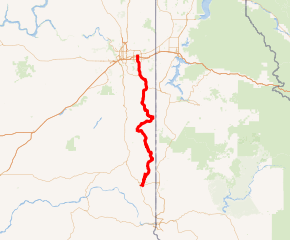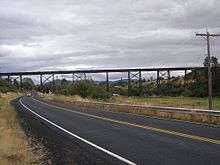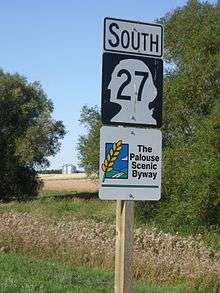Washington State Route 27
State Route 27 (SR 27) is a 90-mile-long (145 km) state highway serving Whitman and Spokane counties, located in the eastern region of the U.S. state of Washington. The highway travels generally north from U.S. Route 195 (US 195) through Pullman, Palouse, Tekoa, and Spokane Valley to SR 290 north of an interchange with Interstate 90 (I-90). SR 27 serves the Palouse region as part of the Palouse Scenic Byway and travels between US 195 to the west and US 95 to the east in Idaho, with several auxiliary routes connecting to the two other highways. The highway has been part of the state highway system since 1913, as a part of the Second Division of the Eastern Route of the Inland Empire Highway between Pullman and Oakesdale that later became a branch of Primary State Highway 3 (PSH 3), as well as Secondary State Highway 3H (SSH 3H) in 1937. Both highways were combined to form SR 27 during the 1964 highway renumbering and the designation was extended south to the US 195 bypass of Pullman in 1975 and north to SR 290 in 1991.
| ||||
|---|---|---|---|---|

SR 27 highlighted in red | ||||
| Route information | ||||
| Defined by RCW 47.17.115 | ||||
| Maintained by WSDOT | ||||
| Length | 90.00 mi[1] (144.84 km) | |||
| Existed | 1964[2]–present | |||
| Tourist routes | Palouse Scenic Byway | |||
| Major junctions | ||||
| South end | ||||
| ||||
| North end | ||||
| Location | ||||
| Counties | Whitman, Spokane | |||
| Highway system | ||||
| ||||
Route description

SR 27 begins its 90-mile-long (145 km) route as Grand Avenue and part of the Palouse Scenic Byway at an intersection with US 195 south of Pullman.[3][4][5] The highway travels through downtown Pullman and becomes concurrent with SR 270 as it passes west of the Washington State University main campus.[6][7] Grand Avenue crosses the South Fork Palouse River and leaves the city of Pullman,[8] parallel to a Washington State Department of Transportation (WSDOT) rail line as it travels into the Palouse.[9] SR 27 travels northeast to the city of Palouse and crosses the Palouse River before a short concurrency with SR 272.[10][11] The highway continues northwest alongside the WSDOT rail line through the town of Garfield and Oakesdale before serving as the southern terminus of SR 271 west of Oakesdale Airport.[12][13][14] SR 27 travels northeast and crosses Hangman Creek into Tekoa as Crosby Street before it intersects SR 274, locally known as Poplar Street, at the north end of the city.[15][16] The highway turns west onto Poplar Street and travels under a bridge carrying the John Wayne Pioneer Trail before leaving Tekoa and Whitman County for Spokane County.[1][17][18]
SR 27 continues north along a Union Pacific rail line through Latah and Fairfield toward Rockford,[9][19][20] where it serves as the western terminus of SR 278 and the Palouse Scenic Byway ends.[4][5][21] The highway travels north out of the Palouse and to the Spokane Valley neighborhood of Opportunity,[22][23] and widens to four lanes as Pines Road. SR 27 intersects I-90 in a diamond interchange that utilizes Indiana Avenue and Montgomery Drive as exit ramps.[24] The highway continues north and crosses two rail lines, belonging to the Spokane International branch of Union Pacific and BNSF,[9] before the designation ends at Trent Avenue, signed as SR 290.[1][17]
Every year, WSDOT conducts a series of surveys on its highways in the state to measure traffic volume. This is expressed in terms of average annual daily traffic (AADT), which is a measure of traffic volume for any average day of the year. In 2011, WSDOT calculated that the busiest section of SR 27 was its interchange with I-90 in Spokane Valley, serving 27,000 vehicles, while the least busy section was between Tekoa and Latah, serving 640 vehicles.[25]
History
SR 27 was first codified as part of the Second Division of the Eastern Route of the Inland Empire Highway between Pullman and Oakesdale in 1913 and later became a paved branch of PSH 3 during the creation of the primary and secondary state highways in 1937.[26][27] The branch route traveled 68.71 miles (110.58 km) north from US 195 at the Idaho state border through Pullman and Oakesdale to PSH 3 and US 195 south of Rosalia.[28] SSH 3H was also established in 1937, traveling 38.69 miles (62.27 km) north from the PSH 3 branch in Oakesdale through the Palouse to PSH 2 and US 10 in Spokane Valley.[28][29][30] The two highways were combined to form SR 27 during the 1964 highway renumbering, part of a new state highway system still in place today.[31][32] A western bypass of Pullman for US 195 was originally planned in the late 1960s and was opened in 1974 as part of a proposed ring road around the city.[33][34] US 195 was routed onto the completed segment and SR 27 was extended south over its former route to intersect the new highway in 1975,[2] while the rest of the bypass would become the un-built SR 276.[35][36] The highway was extended north within Spokane Valley from its interchange with I-90 to Trent Avenue, signed as SR 290, in 1991.[37][38] The highway between Pullman and Tekoa was designated as part of the Palouse Scenic Byway on December 19, 2002, as part of the Washington State Scenic and Recreational Highways program.[39][40] The scenic byway was extended north in 2011 to SR 278 in Rockford.[5][41] A section of SR 27 near Spokane Valley was renamed the Sam Strahan Memorial Highway in 2017, honoring the lone victim of a school shooting at Freeman High School.[42]
Major intersections

| County | Location | mi[1] | km | Destinations | Notes |
|---|---|---|---|---|---|
| Whitman | | 0.00 | 0.00 | Southern terminus | |
| Pullman | 2.27 | 3.65 | South end of SR 270 overlap | ||
| 2.40 | 3.86 | North end of SR 270 overlap | |||
| Palouse | 17.37 | 27.95 | South end of SR 272 overlap | ||
| 17.62 | 28.36 | North end of SR 272 overlap | |||
| Oakesdale | 39.19 | 63.07 | Southern terminus of SR 271 | ||
| Tekoa | 50.80 | 81.75 | Western terminus of SR 274 | ||
| Spokane | Rockford | 71.25 | 114.67 | Western terminus of SR 278 | |
| Spokane Valley | 87.74 | 141.20 | |||
| 88.84– 89.02 | 142.97– 143.26 | ||||
| 90.00 | 144.84 | Northern terminus | |||
1.000 mi = 1.609 km; 1.000 km = 0.621 mi
| |||||
References
- Staff (2012). "State Highway Log: Planning Report 2012, SR 2 to SR 971" (PDF). Washington State Department of Transportation. pp. 652–668. Retrieved February 15, 2013.
- "47.17.115: State route No. 27". Revised Code of Washington. Washington State Legislature. 1970; revised 1975, 1979, 1991. Retrieved February 15, 2013. Check date values in:
|year=(help) - "Feature Detail Report for: Pullman". Geographic Names Information System. United States Geological Survey. September 10, 1979. Retrieved February 15, 2013.
- Washington State Highways, 2006–07: Scenic Byways (PDF) (Map). 1:842,000. Washington State Department of Transportation. 2006. Retrieved February 15, 2013.
- "47.39.020: Designation of portions of existing highways and ferry routes as part of system". Revised Code of Washington. Washington State Legislature. 1967; revised 1969, 1970, 1971, 1973, 1990, 1991, 1992, 1993, 2003, 2009, 2010, 2011. Retrieved February 15, 2013. Check date values in:
|year=(help) - "SR 27: Junction SR 270/SR 270 CO Pullman" (PDF). Washington State Department of Transportation. January 13, 2011. Retrieved February 15, 2013.
- "Feature Detail Report for: Washington State University". Geographic Names Information System. United States Geological Survey. September 10, 1979. Retrieved February 15, 2013.
- "Feature Detail Report for: South Fork Palouse River". Geographic Names Information System. United States Geological Survey. June 21, 1979. Retrieved February 15, 2013.
- 2011 Washington State Rail System (PDF) (Map). Washington State Department of Transportation. January 2012. Retrieved February 15, 2013.
- "Feature Detail Report for: Palouse". Geographic Names Information System. United States Geological Survey. September 10, 1979. Retrieved February 15, 2013.
- "Feature Detail Report for: Palouse River". Geographic Names Information System. United States Geological Survey. September 10, 1979. Retrieved February 15, 2013.
- "Feature Detail Report for: Garfield". Geographic Names Information System. United States Geological Survey. September 10, 1979. Retrieved February 15, 2013.
- "Feature Detail Report for: Oakesdale". Geographic Names Information System. United States Geological Survey. September 10, 1979. Retrieved February 15, 2013.
- "Feature Detail Report for: Oakesdale Airport". Geographic Names Information System. United States Geological Survey. February 1, 2011. Retrieved February 15, 2013.
- "Feature Detail Report for: Hangman Creek". Geographic Names Information System. United States Geological Survey. September 10, 1979. Retrieved February 15, 2013.
- "Feature Detail Report for: Tekoa". Geographic Names Information System. United States Geological Survey. September 10, 1979. Retrieved February 15, 2013.
- Google (February 15, 2013). "State Route 27" (Map). Google Maps. Google. Retrieved February 15, 2013.
- "Feature Detail Report for: John Wayne Trail". Geographic Names Information System. United States Geological Survey. June 1, 1992. Retrieved February 15, 2013.
- "Feature Detail Report for: Latah". Geographic Names Information System. United States Geological Survey. September 10, 1979. Retrieved February 15, 2013.
- "Feature Detail Report for: Fairfield". Geographic Names Information System. United States Geological Survey. September 10, 1979. Retrieved February 15, 2013.
- "Feature Detail Report for: Rockford". Geographic Names Information System. United States Geological Survey. September 10, 1979. Retrieved February 15, 2013.
- "Feature Detail Report for: Spokane Valley". Geographic Names Information System. United States Geological Survey. September 10, 1979. Retrieved February 15, 2013.
- "Feature Detail Report for: Opportunity". Geographic Names Information System. United States Geological Survey. September 10, 1979. Retrieved February 15, 2013.
- "SR 90 - Exit 289: Junction SR 27/Pines Rd" (PDF). Washington State Department of Transportation. September 27, 2011. Retrieved February 15, 2013.
- Staff (2011). "2011 Annual Traffic Report" (PDF). Washington State Department of Transportation. pp. 105–107. Retrieved February 15, 2013.
- Washington State Legislature (March 12, 1913). "Chapter 65: Classifying Public Highways". Session Laws of the State of Washington. Session Laws of the State of Washington (1913 ed.). Olympia, Washington: Washington State Legislature. p. 222. Retrieved February 15, 2013.
The second division of the eastern route, shall commence at a point on the Idaho and Washington line where the same crosses the public road known as the Lewiston and Uniontown road, thence over the most feasible route through Pullman, Palouse and Garfield, thence in a northerly direction, joining the Inland Empire Highway at the most practical point, to be determined by the highway commissioner.
- Washington State Legislature (March 17, 1937). "Chapter 190: Establishment of Primary State Highways". Session Laws of the State of Washington. Session Laws of the State of Washington (1937 ed.). Olympia, Washington: Washington State Legislature. p. 935. Retrieved February 15, 2013.
SEC. 3. A primary state highway to be known as Primary State Highway No. 3, or the Inland Empire Highway, is hereby established according to description as follows: Beginning at a junction with Primary State Highway No. 3, as herein described, in the vicinity south of Rosalia, thence in a southerly direction by the most feasible route by way of Pullman to a point of junction southeast of Uniontown, thence in an easterly direction by two most feasible routes to two points on the Washington-Idaho boundary line.
- Staff (1960). "Annual Traffic Report, 1960" (PDF). Washington State Highway Commission, Department of Highways. pp. 75–77, 175. Retrieved February 15, 2013.
- Washington State Legislature (March 18, 1937). "Chapter 207: Classification of Public Highways". Session Laws of the State of Washington. Session Laws of the State of Washington (1937 ed.). Olympia, Washington: Washington State Legislature. pp. 1000–1001. Retrieved February 15, 2013.
Secondary State Highway No. 3H; beginning at a junction with Primary State Highway No. 2 in the vicinity of Opportunity, thence in a southerly direction by the most feasible route by way of Rockford, Fairfield, Latah and Tekoa to Oaksdale on Primary State Highway No. 3.
- Highways of the State of Washington (DJVU) (Map). Department of Highways. 1939. Retrieved February 15, 2013.
- Prahl, C. G. (December 1, 1965). "Identification of State Highways" (PDF). Washington State Highway Commission, Department of Highways. Retrieved February 15, 2013.
- Washington State Highways, 2011–2012 (PDF) (Map). 1:842,000. Washington State Department of Transportation. 2011. Retrieved February 15, 2013.
- "Pullman Bypass Routes Viewed". Spokane Daily Chronicle. February 21, 1970. p. 25. Retrieved February 15, 2013.
- "Pullman bypass nearly complete". Lewiston Morning Tribune. November 19, 1974. p. 11. Retrieved February 15, 2013.
- "47.17.502: State route No. 276". Revised Code of Washington. Washington State Legislature. 1973. Retrieved February 15, 2013.
- "Pullman's Bypass Project Debated". Spokane Daily Chronicle. February 28, 1975. p. 47. Retrieved February 15, 2013.
- Washington State Legislature (May 21, 1991). "Chapter 342: Engrossed Senate Bill 5801 - State Highway Routes -- Revisions To". Session Laws of the State of Washington. Session Laws of the State of Washington (1991 ed.). Olympia, Washington: Washington State Legislature. Retrieved February 15, 2013.
- Staff (1992). "1992 Annual Traffic Report" (PDF). Washington State Department of Transportation. pp. 73–74. Retrieved February 15, 2013.
- "Scenic byway could run through Palouse". Lewiston Morning Tribune. December 21, 2002. p. 18. Retrieved February 15, 2013.
- "Resolution No. 670" (PDF). Washington State Transportation Commission. March 2005. Retrieved March 30, 2013.
- "Highway 27 from Tekoa to Rockford designated Scenic Byway". The Spokesman-Review. June 23, 2011. Retrieved February 15, 2013.
- Collingwood, Ryan (November 17, 2017). "Portion of U.S. Highway 27 to be named Sam Strahan Memorial Highway". The Spokesman-Review. Retrieved October 1, 2018.
